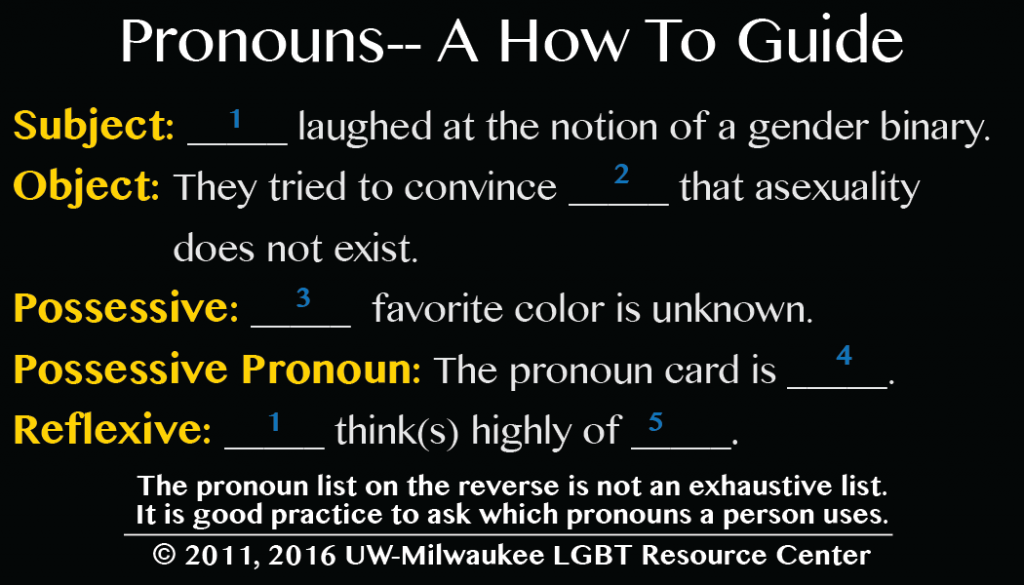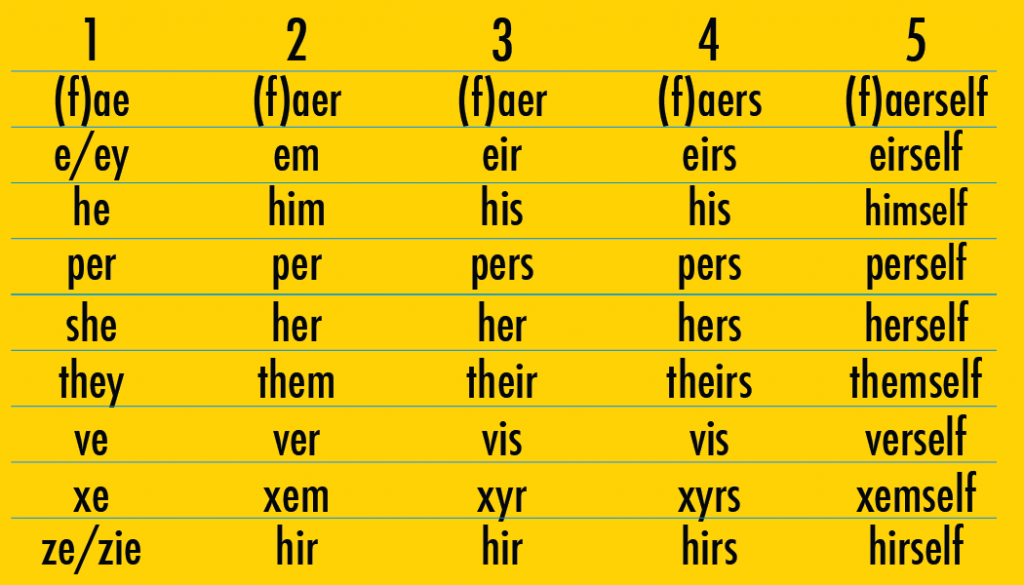He Him & Us Read Online Free
First, let's showtime off with the most often asked questions well-nigh Personal Gender Pronouns (PGPs).
Oft Asked Questions
It'south okay! Everyone slips up from time to fourth dimension. The all-time thing to practice if yous use the incorrect pronoun for someone is to say something right abroad, similar "Sorry, I meant (insert pronoun)"
If yous realize your mistake later the fact, apologize in private and motility on.
A lot of the time information technology can be tempting to get on and on most how bad y'all feel that y'all messed up or how hard it is for you to become it correct. Please don't! Information technology is inappropriate and makes the person who was misgendered feel bad-mannered and responsible for comforting you, which is absolutely not their job.
Taking an active role in your classes, you may hear one of your students using the wrong pronoun for someone. In most cases, information technology is advisable to gently right them without further embarrassing the private who has been misgendered. This means saying something like "Alex uses the pronoun she," and then moving on. If other students or faculty are consistently using the incorrect pronouns for someone, practise not ignore it! It is important to let your student know that you lot are their ally.
Information technology may be advisable to approach them and say something like "I noticed that you were getting referred to with the incorrect pronoun earlier, and I know that that can be really hurtful. Would you be okay with me taking them aside and reminding them near your pronouns?" Follow upwards if necessary, but take your cues from the comfort level of your student. Your deportment will exist greatly appreciated.
Yous can't always know what someone's pronouns are by looking at them. Request and correctly using someone'south pronouns is one of the most basic ways to show your respect for their gender identity.
When someone is referred to with the incorrect pronoun, it tin brand them feel disrespected, invalidated, dismissed, alienated, or dysphoric ( oft all of the to a higher place.)
It is a privilege to not have to worry near which pronoun someone is going to use for you based on how they perceive your gender. If you have this privilege, withal fail to respect someone else'due south gender identity, it is not but disrespectful and hurtful, but also oppressive.
She/her/hers and he/him/his are a few ordinarily used pronouns. Some people telephone call these "female person/feminine" and "male/masculine" pronouns, but many avoid these labels because not everyone who uses he feels like a "male" or "masculine."
In that location are also lots of gender-neutral pronouns in use. Here are a few you might hear:
- They/them/theirs (Shea ate their nutrient considering they were hungry.) This is a pretty common gender-neutral pronoun and it can exist used in the singular. In fact, "they" was voted every bit the Word of the Twelvemonth in 2015.
- Ze/hir/hir (Tyler ate hir food because ze was hungry.) Ze is pronounced like "zee" can too be spelled zie or xe, and replaces she/he/they. Hir is pronounced like "here" and replaces her/hers/him/his/they/theirs.
- Just my name please! (Ash ate Ash's food considering Ash was hungry) Some people prefer not to apply pronouns at all, using their name every bit a pronoun instead.
Never refer to a person every bit "it" or "he-she". These are offensive slurs used against trans and gender non-befitting individuals.
A pronoun is a word that refers to either the people talking (I or you) or someone or something that is beingness talked nearly (like she, information technology, them, and this). Gender pronouns (he/she/they/ze etc.) specifically refer to people that you are talking about.
Pronouns – A How To Guide

 Notation: the top line is meant to indicate two divide – but similarly spelled – sets of pronouns. They are ae/aer/aers and fae/faer/faers.
Notation: the top line is meant to indicate two divide – but similarly spelled – sets of pronouns. They are ae/aer/aers and fae/faer/faers.
Pronouns Practise App (Minus18)
Gender Neutral / Gender Inclusive Pronouns
A gender neutral or gender inclusive pronoun is a pronoun which does not associate a gender with the private who is being discussed.
Some languages, such as English language, practice not have a gender neutral or third gender pronoun available, and this has been criticized, since in many instances, writers, speakers, etc. use "he/his" when referring to a generic individual in the 3rd person. Too, the dichotomy of "he and she" in English does not leave room for other gender identities, which is a source of frustration to the transgender and gender queer communities.
People who are limited by languages which do not include gender neutral pronouns have attempted to create them, in the involvement of greater equality.
| HE/SHE | HIM/HER | HIS/HER | HIS/HERS | HIMSELF/HERSELF |
| zie | zim | zir | zis | zieself |
| sie | sie | hir | hirs | hirself |
| ey | em | eir | eirs | eirself |
| ve | ver | vis | vers | verself |
| tey | ter | tem | ters | terself |
| east | em | eir | eirs | emself |
History of Gender Inclusive Pronouns
Native English language Pronouns
"Ou, a": Native English Gender-Neutral Pronouns. According to Dennis Baron'southward Grammar and Gender:
In 1789, William H. Marshall records the existence of a dialectal English language epicene pronoun, atypical ou : "'Ou will' expresses eitherhe volition,she will, orit will." Marshall traces ou to Middle English epicene a, used by the fourteenth-century English writer John of Trevisa, and both the OED and Wright'due south English Dialect Dictionary ostend the utilise of a forhe, she, it, they, and evenI.
The dialectal epicene pronoun a is a reduced form of the Old and Center English masculine and feminine pronounshe andheo. By the twelfth and thirteenth centuries, the masculine and feminine pronouns had developed to a point where, according to the OED, they were "almost or wholly indistinguishable in pronunciation." The modern feminine pronounshe, which showtime appears in the mid 12th century, seems to take been drafted at least partly to reduce the increasing ambivalence of the pronoun system....
He goes on to draw how relics of these sexual activity-neutral terms survive in some British dialects of Modern English, and sometimes a pronoun of i gender might exist applied to a person or beast of the opposite gender.
Language Authorities
"One"
In 1770, Robert Bakery suggested use of "one, ones" instead of "ane, his", since there was no equivalent "one, hers". Others shared this sentiment in 1868, 1884, 1979, and even at present. Others throughout this period disagreed, finding information technology too pedantic.
"His or Her" vs. Atypical "They"
Effectually 1795, the linguistic communication authorities Lindley Murray, Joseph Priestly, and Hugh Blair, amongst others, campaigned against pronoun irregularities in pronoun employ, such as lack of agreement in gender and number. Without coining words, this can only be washed in the third person singular by use of compound terms similar "his or her". Grammarians in 1879, 1922, 1931, 1957, and the 1970s take accepted "they" as a atypical term that could be used in identify of "he" or "he or she", though sometimes limiting it to informal constructions. Others in 1795, 1825, 1863, 1898, 1926, and 1982 argued against it for diverse reasons. And whatever the grammarians might argue, people have been using the singular "they" for about the last 600 years, though (equally mentioned earlier) it tin only be applied in sure cases. If new gender-neutral pronouns are not adopted, i'1000 sure that singular "they" will still be a betoken of contention for centuries to come. For further information on the use of singular "their" throughout the centuries, see the big torso of information that Henry Churchyard has compiled on the subject.
 This work is licensed under a Creative Eatables Attribution-NonCommercial four.0 International License.
This work is licensed under a Creative Eatables Attribution-NonCommercial four.0 International License.
Source: https://uwm.edu/lgbtrc/support/gender-pronouns/
0 Response to "He Him & Us Read Online Free"
Post a Comment